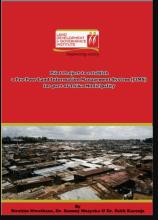Land Library
Welcome to the Land Portal Library. Explore our vast collection of open-access resources (over 74,000) including reports, journal articles, research papers, peer-reviewed publications, legal documents, videos and much more.
/ library resources
Showing items 55 through 63 of 70.COUNTY GOVERNMENTS ACT NO. 17 OF 2012
Date of assent: 24th July, 2012.
Date of commencement: See Section 1.
The acquisition of land by foreigners in developing countries has emerged as a key mechanism for foreign direct investment (FDI).
In Kenya, insecure land tenure and inequitable access to land and natural resources have contributed to conflict and violence, which has in return exacerbated food insecurity. Most farmers in Kenya have no legal title for the land on which they farm.
The acquisition of land by foreigners in developing countries has emerged as a key mechanism for foreign direct investment (FDI).
According to 2001 statistics, 924 million people, almost one third of the world’s population lived in slums. A majority of these people are in the developing countries and they account for 43% of the urban population.
Fiscal instruments are tools that governments use to manage revenue and expenditure and therefore influence the growth (or stability) of the various sectors of the economy. Government revenue is derived primarily through taxation.
Land plays a vital and central role in the economic, social-cultural and political lives of both individuals and communities.
This research gives an evaluation of Tana delta with regard to areas that are suitable for rice growing. The study area lies on the Eastern delta area of the Tana river of which 16000 hectares have been earmarked for commercial rice farming.
Despite a history of more than 100 years and the introduction of provisional maps to support land registration, the Kenyan cadastre is largely incomplete. It consists of a patchwork of maps of different positional qualities, which would not be readily integrated to create a nation-wide coverage.









